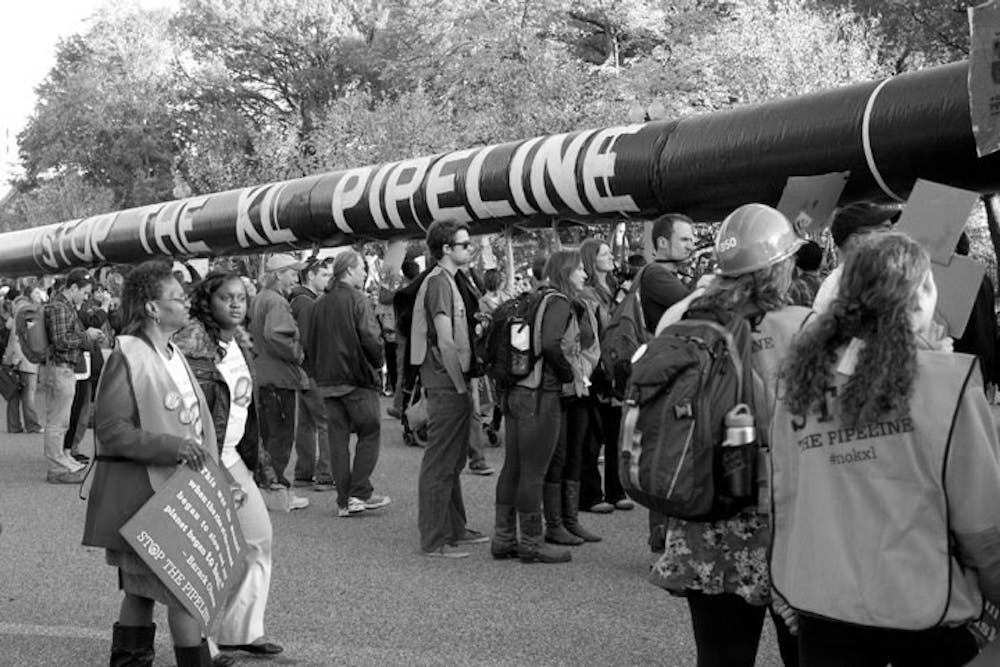Last week, the towns of Cornwall, Shoreham and Monkton voted against a plan to extend a Vermont Gas pipeline from Middlebury to Rutland. The pipeline would pass through their town land.
The non-binding votes, held in town meetings, showed strong opposition to the project. Cornwall’s vote was 126-16, while Shoreham’s was 63-38.
Vermont Gas, based in South Burlington, is preparing a plan to install a pipeline that will bring natural gas from Canada through Vermont, and eventually into New York. Phase 1 of the plan involves construction of a 41-mile pipeline extension from Burlington to Middlebury and Vergennes. The state’s Public Service Board approved Phase 1 last December. Phase II would expand construction of the pipeline to Rutland and eventually to the International Paper Mill in Ticonderoga, New York.
The construction of the pipeline is a regional project, meaning individual towns officially have no role in the approval of the proposal. However, sufficient public outcry and petitioning in Cornwall, Shoreham, and Monkton has enabled the issue to be deliberated in town meetings. Middlebury never had such a vote, and opposition was not as vocal.
There are various perspectives as to why these three towns have reacted more strongly than Middlebury to the proposed pipeline. Isaac Baker ’14 has interviewed affected landowners and studied various aspects of the issue for his senior thesis work. Small towns such as Cornwall, Shoreham, and Monkton would experience the imposition of the pipeline, but would not receive the economic benefits of the gas, since delivering gas to homes is not cost effective in more rural areas, according to Baker.
More densely populated areas like Middlebury are more likely to garner the advantages of cheap fuel since most businesses and residents will have access to the gas.
“The economic benefit is going to be felt in a big way [in Middlebury],” said Baker.
Vermont Gas is strategically trying to affect as few people as possible in the construction of its pipeline. Consequently, there are only six affected landowners in Cornwall. However, in opposition to the pipeline, “people are rallying more around property rights” than environmental issues, explained Baker.
Affected landowners are anxious about the disruption the pipeline construction would cause their land. The project requires a lot of machinery and would overturn potentially precious soil. The repercussions of such disturbances could be significant, especially for farmers whose livelihood depends on their land.
Rising Tide Vermont, part of an international organization dedicated to reducing environmental degradation, has been involved with community meetings and organizing affected landowners who oppose the pipeline. According to a member of Rising Tide Vermont, the three towns that voted against the pipeline may have done so because affected landowners will suffer the property damage, without reaping the benefits of the project. Additionally, the landowners in these small towns are more reliant on their farmland than in places like Middlebury.
Vermont Gas has said, “If people don’t want the pipeline, we’re not going to come.” Rising Tide believes that “the point of the vote was to hold them to that.”
Staunch opposition from towns such as Cornwall, Shoreham and Monkton has led to speculation that Vermont Gas might implement eminent domain. The official project website of the Addison Rutland Natural Gas Project, or ARNGP, states, “If the project has been found to be in the public interest by the Public Service Board but an individual does not choose to grant an easement, then the option of eminent domain is possible” as a last resort.
Rising Tide also opposes the pipeline because the natural gas it would carry would be obtained through the controversial process of hydraulic fracturing. Vermont became the first state to ban fracking in May of 2012. Fracking has been criticized for causing devastating pollution of the air and water in communities where it is practiced.
Indeed, those who have spoken out against the pipeline feel it would be a step backwards for a state that hopes to be 90 percent reliant on renewable energy sources by 2050. Though natural gas is the cleanest-burning of all the fossil fuels, activists believe the state should hold to its commitment to promote truly sustainable energy. “By using nature, we can create a sustainable future, but we have to get cracking. Now’s the time to do it,” said owner of Vermont Soap Larry Plesent in a recent press conference.
In contrast to these sentiments, the College publicly backed Phase I of the proposal in a statement issued by President Ron Liebowitz last May. In a letter of support released in March 2011, the College asserted that “we continue to believe that the pipeline will benefit the region and the college in numerous ways for years to come.”
Liebowitz cited both the economic and environmental advantages of natural gas. According to the project website, natural gas is 43 percent cheaper than oil and 56 percent cheaper than propane, as of April 2013. The company also projects that Phase I of the project will decrease Vermont’s greenhouse gas emissions by 300,000 tons over a period of 20 years.
Some local Middlebury business owners have spoken in favor of the pipeline. The General Manager of the Middlebury Inn, Geoffrey Conrad, sounded excited about the project in an interview a few months ago with Channel 5 news. Though he acknowledges the investment it will take to convert all of his heaters and other equipment to support natural gas, he is eager for the long-term economic benefits.
“Our propane and heating oil expenses each year are over $100,000 and they’re projecting 50 percent savings,” he said.
Doug Dimento, a spokesperson for the Agri-Mark, which has one of their two Vermont locations in Middlebury, released a statement in support of the pipeline saying that that “reducing costs will make [their] products more competitive in the national marketplace and hopefully will increase cheese production, sales, and
returns back to [their]farmer owners.” Many believe that Vermont would benefit from this competitive edge.
The impetus for Phase II of the ARNGP was an agreement between Vermont Gas and International Paper’s Ticonderoga Mill, located just across the Vermont border in New York. Vermont Gas has promised that the pipeline will be providing natural gas fuel to the industrial mill by 2015. According to Jake Nonweiler ’14, who studied the pipeline project closely as part of his senior seminar, the company is offering to invest tens of millions of dollars to fund the project in order to receive long-term economic benefits. Additionally, International Paper hopes to for a 20 percent reduction in its greenhouse gas emissions by 2020. Approximately 35-40
percent of the mill’s current energy consumption is based on fuel oil. Switching to natural gas could help the company reach this goal.
The benefits for International Paper are clear. However, because Vermont residents of towns such as Cornwall and Shoreham won’t profit as much as others from the advantages of the pipeline, Phase II is meeting a lot of resistance.
“In general, part II is more contentious and more difficulty to justify. It’s more a benefit to one entity, and that’s International Paper,” Nonweiler said.
Three Towns Vote Against Pipeline

Comments


